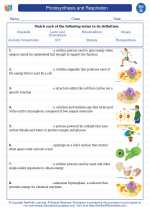Proteins
Proteins are large, complex molecules that play many critical roles in the body. They are made up of long chains of amino acids and are essential for the structure, function, and regulation of the body's tissues and organs.
Structure of Proteins
Proteins are composed of a sequence of amino acids, which are linked together by peptide bonds. There are 20 different types of amino acids that can be combined in various sequences to form a wide variety of proteins. The unique sequence and arrangement of amino acids give each protein its specific structure and function.
Functions of Proteins
Proteins have a wide range of functions in the body, including:
- Enzymes: Many proteins act as enzymes, which are biological catalysts that speed up chemical reactions in the body.
- Structural Support: Proteins provide structural support for cells, tissues, and organs. For example, collagen is a protein that provides strength and flexibility to connective tissues.
- Transport: Some proteins act as carriers, transporting molecules such as oxygen, nutrients, and waste products throughout the body.
- Immune Function: Antibodies are proteins that play a key role in the immune system, recognizing and neutralizing foreign substances such as bacteria and viruses.
- Hormones: Certain proteins, such as insulin, act as hormones that regulate various physiological processes in the body.
Sources of Proteins
Proteins are obtained from a variety of food sources, including:
Study Guide: Proteins
Here are some key points to remember about proteins:
- Proteins are composed of long chains of amino acids linked by peptide bonds.
- There are 20 different types of amino acids that can be combined to form proteins.
- Proteins have various functions in the body, including enzyme activity, structural support, transport, immune function, and hormone regulation.
- Good food sources of protein include meat, poultry, fish, dairy products, legumes, nuts, and seeds.
- Proteins are essential for the growth, repair, and maintenance of body tissues.
Understanding the structure and functions of proteins is essential for comprehending the role they play in the body's overall health and functioning.
.◂Science Worksheets and Study Guides Seventh Grade. Photosynthesis and Respiration
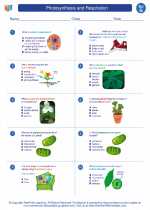
 Worksheet/Answer key
Worksheet/Answer key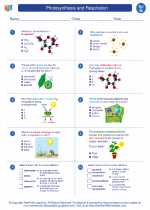
 Worksheet/Answer key
Worksheet/Answer key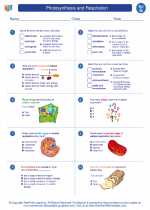
 Vocabulary/Answer key
Vocabulary/Answer key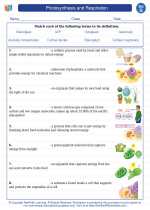
 Vocabulary/Answer key
Vocabulary/Answer key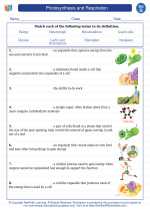
 Vocabulary/Answer key
Vocabulary/Answer key